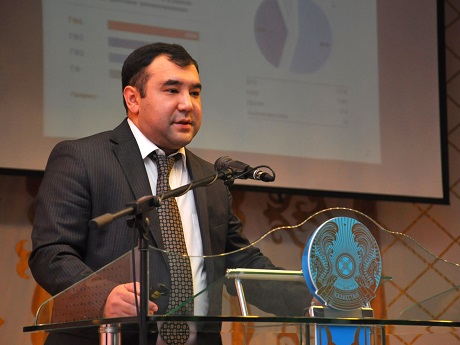A seminar series titled “Scientific Projects Evaluation and Funding System” was held at S. Toraighyrov Pavlodar State University under the auspices of the National Center of Science and Technology Evaluation JSC (NCSTE).
Greeting participants of the event, Rector of S. Toraighyrov PSU Aryn Orsariyev noted that “the University has accumulated great potential for 55 years of development; PSU, which is considered as a regulator of a scientific thought, has got much to show and has been making commitments to the development of the scientific cluster of Kazakhstan for many years.”
Assanbay Dzhumabekov, Chairman of the Board of NCSTE (Astana), started the seminar series. According to him, the seminar is primarily designed to be of interest to scientists and inventors of universities. The seminar is aimed at clarifying the key aspects of improvement of the science and technology evaluation system which is an integral element of scientific invention and project implementation.
А. Dzhumabekov delivered a seminar in the form of an interactive online presentation, having provided illustrative examples of the center’s activity.
The expert paid special attention to difficulties and hidden rocks, which talented inventors often could confront with. At this rate, Mr. Dzhumabayev noted that “even those projects, which have been thoroughly elaborated, may fail to pass through the expert evaluation procedure in NCSTE; the reason is that some authors are condemned for pseudo-authorship, falsification of data and plagiarism; this has become quite common in the CIS countries over the past fifteen years.”
Assanbay Dzhumabekov also touched the ethical and geo-regional issues of invention and innovation implementation.
The expert mentioned a biotechnology work published in one of South Korean scientific periodicals, which, being inherently pseudo-authored and falsified, was exposed a year after. As the result, one fraudulent publication took a toll on the whole biotechnological sphere of South Korea and compromised the country’s reputation.
In this respect, Mr. Dzhumabekov called on inventors and scientists-innovators to stick to the moral and ethical code of men of science. According to him, it becomes a matter of great importance when Kazakhstan strives to enter the top 50 countries. Once again he quoted a phrase, “At first you work for your reputation, then your reputation works for you.”
The expert expressed his confidence that “the norm of abiding by copyright laws and forming a sound conceptual idea of inventorship will become ingrained in our everyday lives in the coming years and Kazakhstan will be one of those countries where this norm is de facto.”
Both established scientists of PSU and their future successors showed keen interest with the seminar contents.








